Memoirs & Diaries - Torpedoed in the Aegean Sea
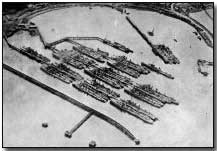 The early part of April
1917 found H.M. Transport Arcadian, as she then was, with a full
complement of "cannon-fodder" pushing her nose through the grey seas in the
direction of the Eastern theatres of War, Salonika and Palestine.
The early part of April
1917 found H.M. Transport Arcadian, as she then was, with a full
complement of "cannon-fodder" pushing her nose through the grey seas in the
direction of the Eastern theatres of War, Salonika and Palestine.
At that time the submarine blockade, which was intended to bring Great Britain to her knees, was in full swing, and the constant fear of the ocean traveller was the making of the unwelcome acquaintance of a torpedo, or "tin fish", as that death-dealer was familiarly known.
Apart from one or two scares, no untoward incident occurred this side of Malta, and reaching that stage of the journey, one of the two Japanese destroyers that, so far, had afforded us protection, remained in harbour, leaving the Arcadian for the remainder of the journey with only one destroyer zigzagging at a respectful distance across our bows.
The Japanese destroyer brought us, after days and nights of steaming, within sight of the African coast. This was the scene of our first brush with the enemy.
A submarine had been spotted, and with the destroyer circling around at full speed, belching out the while a thick black smoke screen, we raced as fast as the engines would turn over, to a place of comparative safety, that being a small river on the north coast of Africa.
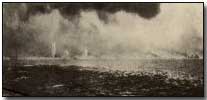 There
we were literally bottled-up for three days together with another crowded
transport, while our underwater foe patrolled the river's mouth waiting and
watching for us to come out. Upon the morning of the third day, the
other transport set out only to return in the early afternoon in a sinking
condition.
There
we were literally bottled-up for three days together with another crowded
transport, while our underwater foe patrolled the river's mouth waiting and
watching for us to come out. Upon the morning of the third day, the
other transport set out only to return in the early afternoon in a sinking
condition.
After that, we were not too optimistic as to our chances, but in the early evening the Arcadian directed her nose seawards once more, steaming out into the open without mishap. Our Japanese friends, of course, still playing the part of protector.
Arrived at Salonika, the troops intended for that front disembarked, and, under cover of darkness, we of the Egyptian contingent put forth to sea bound for Alexandria. Three hundred souls of us, however, were destined not to reach that objective.
Through the night we sped on our way down the Aegean Archipelago, and the following evening, a Sunday, saw our real encounter with the U-boat that had dogged us so relentlessly. Without one moment's warning, a terrific explosion occurred, made hideous by the splintering into matchwood of great timbers, the crash of falling glass and the groaning of steel girders wrenched asunder, followed by the hissing rush of escaping steam from the ship's boilers.
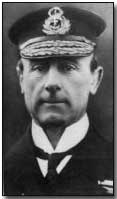 Nobody
needed enlightening as to the fact that the old Arcadian, which had so often
completed the Eastern trip, had received a "Blighty" one, and was shortly
due for Davey Jones's locker.
Nobody
needed enlightening as to the fact that the old Arcadian, which had so often
completed the Eastern trip, had received a "Blighty" one, and was shortly
due for Davey Jones's locker.
If doubts existed, these were soon dispelled, since, having given one convulsive shudder from end to end, the great ship began to settle down on her port side with the loose deck paraphernalia slithering about in all directions and dropping into the sea.
To get away easier, I discarded my military boots, and donned a life-belt. On reaching the side of the ship and peering over, one of the two small boats which had survived the explosion was to be seen putting away full to overflowing with men. Nothing else remained but to make the descent into the sea by a rope conveniently to hand, and this I attempted.
Unfortunately, my equilibrium on the ship's rail was disturbed by someone in great haste to be among the rescued, and, falling, my arm became jammed at the wrist between two steel uprights employed as supports.
For moments that seemed long years, I was dangling from the side of the rapidly sinking Arcadian, but was rescued just in time from that perilous position by two comrades, one easing my weight from underneath the shoulders while the other wrenched the caught arm from the fixture.
I do not know the identity of my rescuers to this day. Seizing the means of escape, I shinned quickly down into the sea - my hands suffering badly from rope-burns, and was surprised to find the water comfortably warm. My attire consisted of trousers, shirt and socks.
The lifebelt, I found, supported my body so that my head from the chin was above water, and I looked about me, taking in the seascape. Being a non-swimmer at that time, I was unable to get clear of the ship, and her enormous bulk seemed likely to topple over upon me at any moment, supposing I was not sucked down one of the huge funnels by the inrush of water.
That actually did happen to our Chaplain. He was, subsequently, vomited out again like a rocket and suffered no ill effects, when the water charging up against the heated boilers caused an explosion.
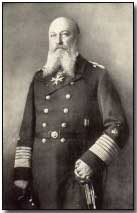 Having
read about the vortex a sinking vessel will make, I was ruminating on my
chances as a survivor. The suspense, fortunately, was brief.
Having
read about the vortex a sinking vessel will make, I was ruminating on my
chances as a survivor. The suspense, fortunately, was brief.
For a moment or two the Arcadian partly righted on her keel and then with much hissing of escaping steam and explosions from the boiler rooms, she slid for ever out of sight of human eyes, carrying with her hundreds of troops and her own crew caught like rats on the lower decks.
Within three minutes (official Admiralty time) from the time that she was struck all that remained of the ship was bits of floating wreckage.
It is difficult to describe my sensations during the minute or so following. Down and still further down, I was dragged by the suction till it seemed that I must soon touch bottom. I was spun round with great rapidity and swirled about in an alarming manner.
I held my breath and closed tightly both eyes and mouth, until forced by bursting lungs to take in air, I opened my mouth, getting a large helping of Aegean Sea.
My mind was functioning normally. I can recollect that I had quite decided that H.M. Army was about to lose one live cavalryman. And though I cannot justly claim to being more courageous than my neighbour, it is curious that having made up my mind that my name would shortly appear in the casualty lists, I was not the least bit afraid.
I can give no reason. I was young, eighteen at that time, having declared a false age on enlistment, and naturally I had no overwhelming desire to provide provender for the denizens of the deep.
At last, however, I came with a rush to the surface, and was violently ill for some time. Glancing at my wristlet watch, I found it had stopped. The time was 5.45 p.m. Large numbers of drowned, the survivors, and a quantity of wreckage were close by me.
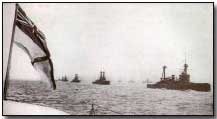 After
desperate efforts to propel myself through the water, I gave up in despair,
finding that no headway was being made.
After
desperate efforts to propel myself through the water, I gave up in despair,
finding that no headway was being made.
That fact, however, was of no importance, as only miles of ocean waste stretched around.
The sun now was lowered on the horizon: the sea became chilly and turbulent. The heads of the survivors by this time were dotted about with great distances between, they having drifted with the wind and the currents.
After some hours, I was brought by the same means within reach of a small raft, which was clutched with considerable gusto, and I found myself in the excellent company of five officers, three Navy and two Army.
Only an occasional word was spoken. Darkness descended quickly, and the sea was bitterly cold.
Wafted across the waters, our ears received the words of the hymn "Nearer my God to Thee". Apparently every poor devil - more than three-quarters drowned - was doing his level best to swell the chorus on that awful night. The incident has imprinted itself indelibly on my memory.
The combined weight of our six bodies completely submerged the slender support, but, nevertheless, by arrangement we each of us managed in turn to scramble on to the raft's surface and to get for a short spell as much of our numbed bodies above sea-level as was possible in the circumstances.
This we continued to do, helping each other as best we could. Towards midnight a small white light was plainly visible in the far distance, and later another, and some time after, another.
Through the ingenuity of one of the Navy officers we were shortly located. In his possession was an electric torch - quite unaffected, apparently, by its prolonged immersion - and with the instrument he proceeded to signal in the Morse code.
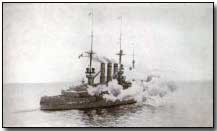 We
watched intently. The beam of a searchlight shot into the sky from the
rescuing ships.
We
watched intently. The beam of a searchlight shot into the sky from the
rescuing ships.
It swung from side to side, missing our little group again and again. Eventually, however, it found its mark.
Then quickly the lantern shut down to allow of a message to be flashed out. Slowly this was read to us by our friend with the torch. "Will pick you up soon as possible with other survivors".
Utter blackness again and another long waiting; this time, however, with a hope. At last there came stealing upon us the tall black bows of a ship. The "Q" ship Redbreast she was. Voices hailed us from the deck. She drew swiftly alongside, and dropped a rope ladder. Down this came a couple of men, who heaved us up.
A basin of piping hot grog, a belabouring with rough towels, a berth with an abundant supply of blankets and to bed.
Trooper Reginald C.
Huggins enlisted in March 1915 in the City of London (Rough-riders)
Yeomanry. Underwent period of cavalry training in Ireland (Curragh and
Dublin) and drafted the East Riding of Yorkshire Imperial Yeomanry for
service on the Palestine Front.
From there in early part of 1918 to France in the 102nd Machine Gun Corps.
Wounded in the fighting before Valenciennes on October 28th, 1918, and
discharged from hospital in May 1921.
First published in Everyman at War (1930), edited by C. B. Purdom.
Photographs courtesy of Photos of the Great War website.
A "chit" was British slang for a piece of paper.
- Did you know?
